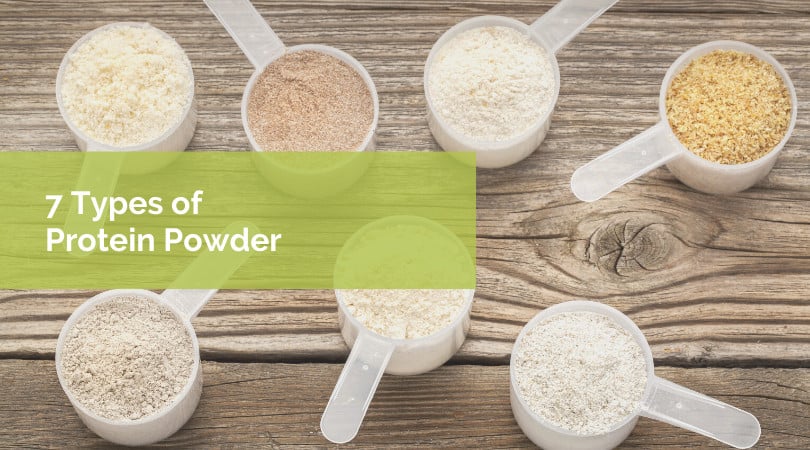
If you have ever shopped for a protein powder, you probably quickly found yourself confused. The number of different types of protein powder available on the market is overwhelming. But, we want to help clarify it for you. While new products are created all the time, there are seven main types of protein powder that you will find at any health food store or online. Each of these types of protein powder has a different use or benefit, so before you choose your product, here are the basics you need to know.
What Are Protein Powders?
Protein powders are concentrated sources of protein in a powdered form. They are derived from plant or animal sources, such as milk, eggs, peas, hemp or rice. They may also have vitamins, minerals or fiber added to the powder to increase the nutrient content or they may just be plain protein powder.
Protein powders can vary in protein content by volume. There are three main types available:
- Protein concentrates: 60-80% protein, with the remainder being carbs and fat.
- Protein isolates: more processed to remove most of the fat and carbs, contain 90-95% protein
- Protein hydrolysates: the most processed, digests the fastest, considered “pre-digested” protein
The type of protein you choose will depend on your individual goals and preferences.
7 Types of Protein Powder
There are seven different types of protein powder available on the market. These are:
Whey protein
Made from milk, whey protein is a fast-digesting protein high in branched-chain amino acids. It has been found to be beneficial for promoting muscle growth, reducing body fat and helping control appetite. The only downside of whey protein is that since whey protein concentrates are less processed, they do contain a small amount of lactose, which could cause digestive problems for those who do not tolerate the sugar in milk.
Casein Protein
Casein protein is also made from milk. But unlike whey, it is digested slowly. Casein protein may provide the body with a steady flow of amino acids. However, for muscle growth casein remains in second place behind whey.
Egg Protein
Eggs are a great source of easy-to-digest, high-quality protein. They are high in branched-chain amino acids, similar to whey protein. In egg-based protein powders, the yolks have been removed. This means that although the protein quality remains the same, egg protein powder may not make you feel quite as satisfied as eating a whole egg.
Pea Protein
Pea protein is a popular choice among vegans, vegetarians or those allergic to dairy. It is made from yellow split peas and is rich in branched-chain amino acids. But, unlike whey or casein, it is not a complete protein. It is missing the essential amino acid methionine. Therefore, it is best combined with other plant-based proteins.
Hemp Protein
Hemp protein is a newer type of protein powder to hit the market. It is high in healthy omega-3 fatty acids. But, like pea protein, it is not a complete protein. It is missing the essential amino acids lysine and leucine. It has also not been extensively researched for its health benefits, like the other types of protein .
Brown Rice Protein
Brown rice protein is a plant protein that is best for those with food allergies, as it is hypoallergenic. Similar to the other plant proteins, it is low in lysine and not considered a complete protein. It may benefit muscle growth, but more research is needed to determine its health effects.
Soy Protein
Soy is the only plant-based protein powder that is also a complete protein, containing all nine essential amino acids. It is a source of phytoestrogens, which may be problematic for people with certain hormone-positive cancer. Also, most of the soy available on the market is genetically modified, so that is something to consider when purchasing soy-based protein powders.
Since many of the plant-based powders are not complete proteins on their own, you will generally find them as a plant-based blend. This allows manufacturers to create a complete protein by combining a few different plant-based proteins.
Choosing the Best Type of Protein Powder
The best type of protein powder for you is one that you enjoy drinking and supports your personal goals and dietary preferences.
If your goal is weight loss or muscle strength, consider whey or casein protein powder.
If you are a vegan, stick with a plant-based product.
If you have food allergies, consider a brown rice protein.
There is a type of protein powder out there to meet almost anyone’s dietary needs and taste preferences. The one you choose should match your requirements and, of course, taste great to you.
- Persistent Tiredness and Chronic Fatigue: Causes and Symptoms - February 27, 2024
- Can A Protein Shake Replace A Breakfast Meal? - March 2, 2023
- Glutamine After Surgery: Does It Help With Recovery? - February 17, 2023





